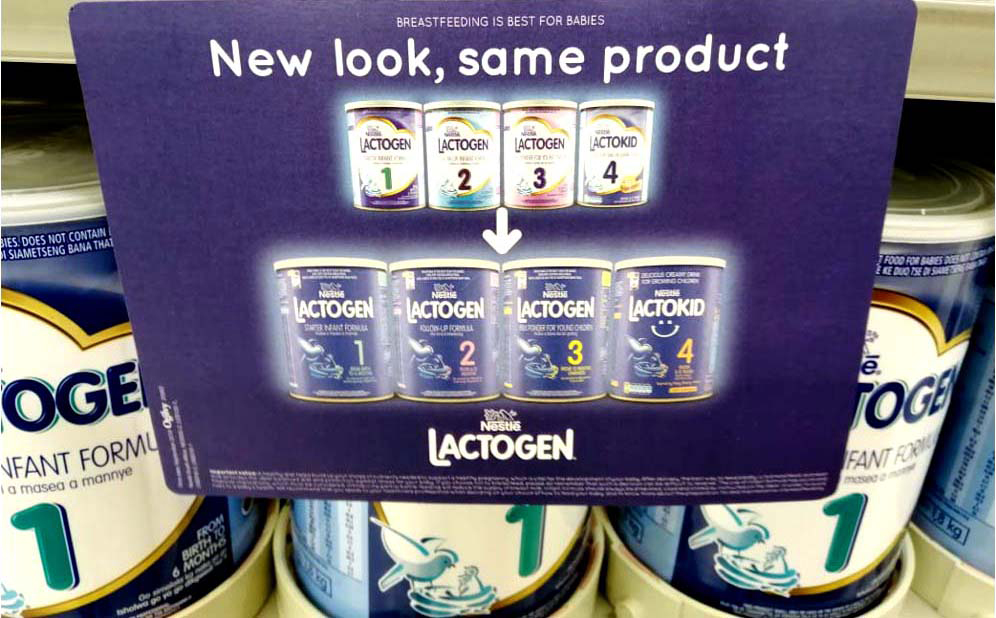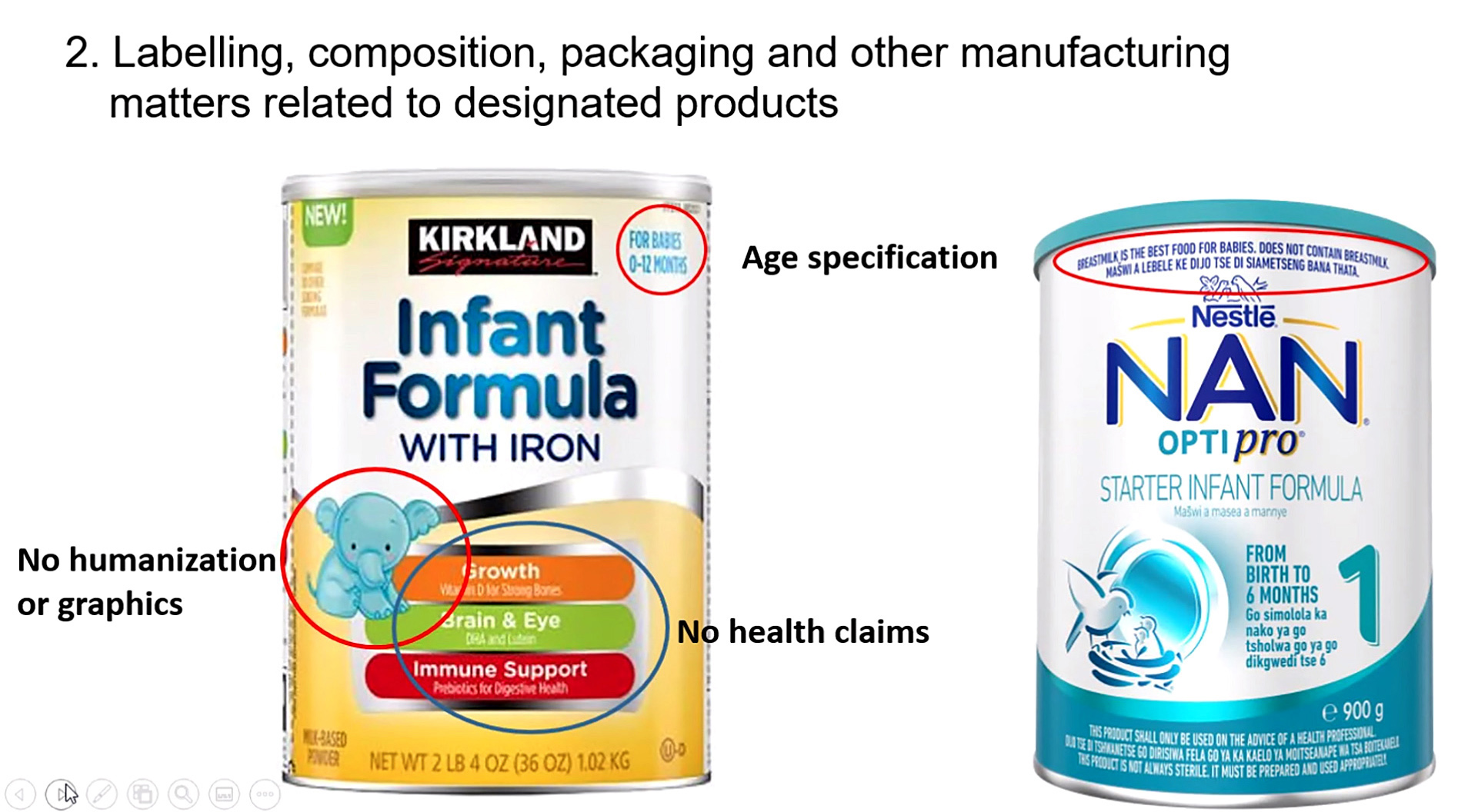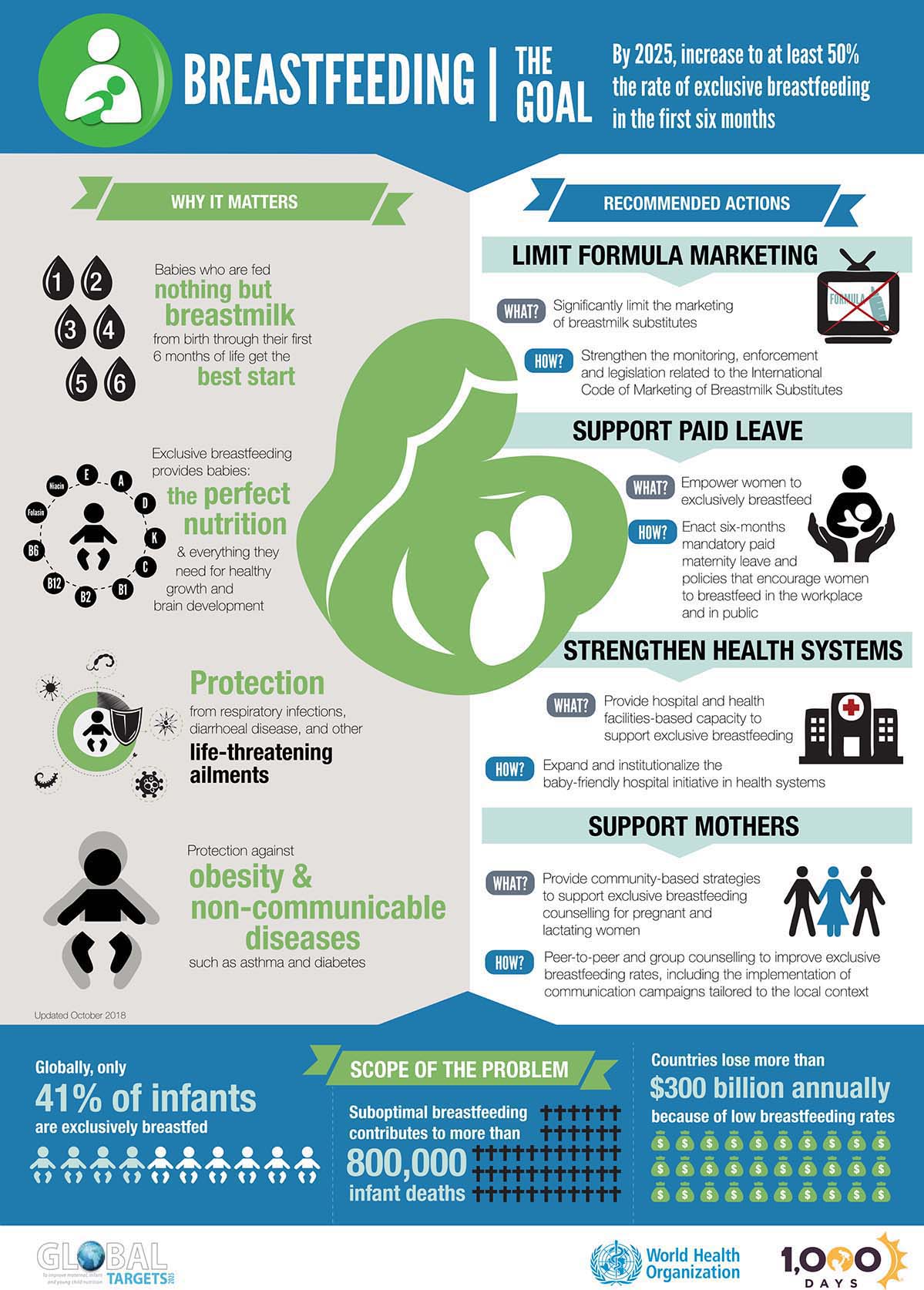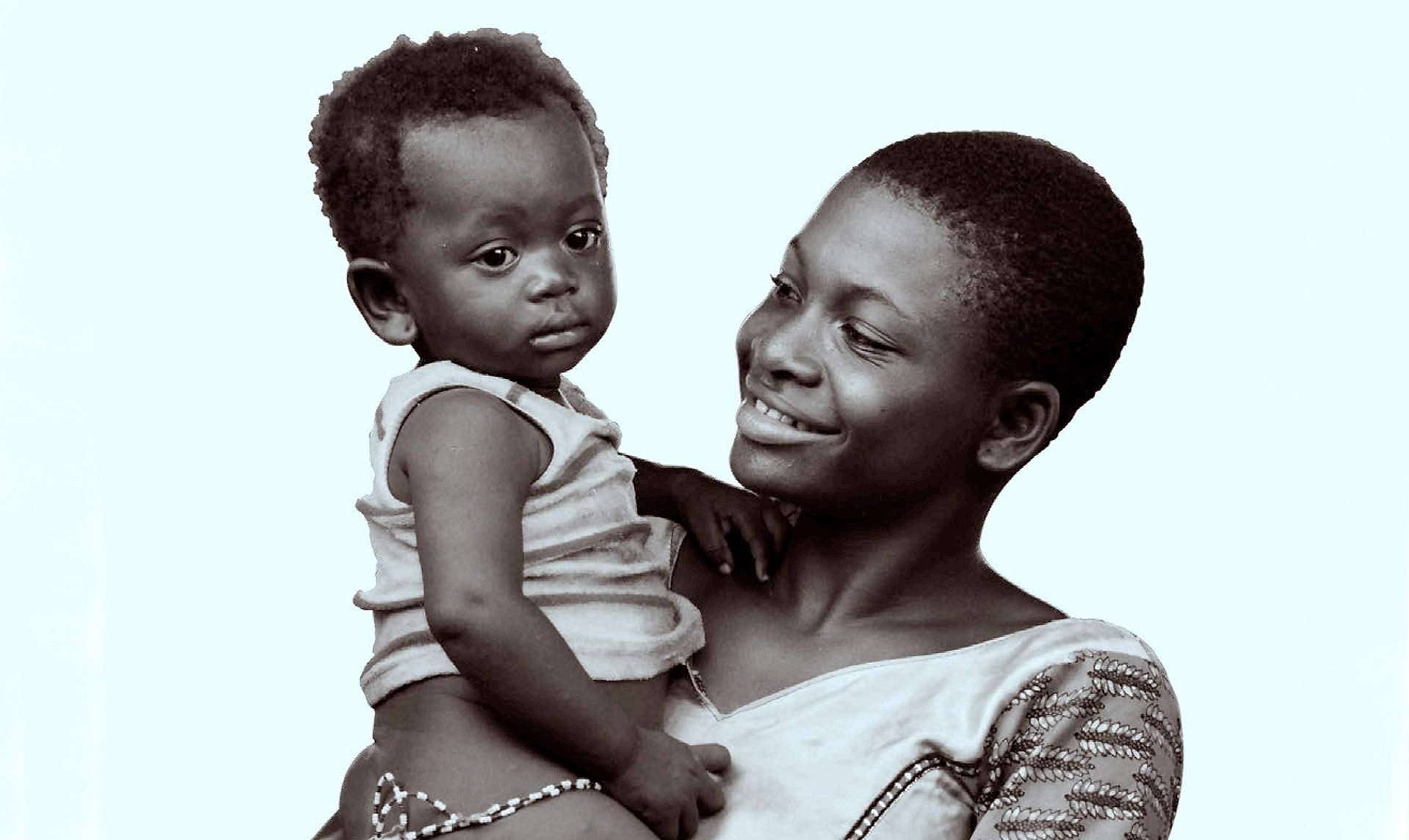A South Africa-focused World Health Organization (WHO) report on the insidious marketing tactics used to sell formula milk calls out South Africa’s “inadequate implementation, lack of awareness and low level of compliance” with the national regulation that prohibits the marketing of formula milk for children up to the age of three. Formula-milk companies’ tactics are “pervasive, personalised, and powerful,” the report says, and enforcement of regulations that outlaw formula-milk marketing is challenging, especially in the digital domain.
South Africa should “urgently” strengthen comprehensive national mechanisms to prevent formula product marketing, WHO says, including closing “all loopholes” — in health, trade and labour legislation — to comply fully with the International Code of Marketing of Breast-milk Substitutes, which was endorsed by 136 countries, including South Africa, in 1981.
The report, published on 1 August, recommends that South Africa “urgently strengthen” specifically enforcement and accountability mechanisms, including holding formula companies accountable for their practices and commitments; regulatory measures, including plain packaging for formula products, and higher standards of evidence for product development.
Though South African law does prohibit the marketing of formula products for babies aged 0-36 months (3 years), the regulation, R991, doesn’t cover Stage 4 products (from 36 months onwards), which are commonly packaged, branded and labelled to closely resemble stage 1–3 formula products, and enable easy, under-the-radar cross-promotion of products that do fall within the scope of R991.
 Though marketing of formula milk for the first three ‘stages’ (up to age 3) is prohibited in South Africa, the almost-identical packaging of stage 4 and stages 1-3 milks allows ‘cross-promotion’ of the products. Commercial marketing of formula products is one of the most under-appreciated influences on women’s decision about infant feeding, World Health Organization (WHO) says. (Photo: Tanya Doherty (SAMRC), Food Imbizo presentation, 16 August 2022)
Though marketing of formula milk for the first three ‘stages’ (up to age 3) is prohibited in South Africa, the almost-identical packaging of stage 4 and stages 1-3 milks allows ‘cross-promotion’ of the products. Commercial marketing of formula products is one of the most under-appreciated influences on women’s decision about infant feeding, World Health Organization (WHO) says. (Photo: Tanya Doherty (SAMRC), Food Imbizo presentation, 16 August 2022)
The newly published report on South Africa also highlights industry tactics to promote formula milk such as distorting scientific evidence to legitimise inaccurate health claims for their product (e.g. that their product is as good as breastmilk), systematic targeting of health professionals (on whom mothers rely most for health information) including incentives and gifts to get them to promote their products, and using manipulative marketing tactics — especially online and via the difficult-to-regulate social media — to exploit parents’ anxieties and aspirations.
These tactics are prohibited in the fine print of R991, which aims to protect and promote breastfeeding by regulating the inappropriate marketing of breast-milk substitutes for children aged 0-3 years, and removing “commercial pressures”, “conflicts of interest” and “perverse incentives” from the infant-feeding arena.
Entitled How the marketing of formula milk influences our decisions on infant feeding, the report is the South Africa component of a global WHO-Unicef report (with the same name) published in February, that focused on the experiences of women in Bangladesh, China, Mexico, Morocco, Nigeria, South Africa, the United Kingdom, and Vietnam relating to their exposure to the marketing of formula milk.
The study, conducted between February 2020 and February 2021, looked at the current formula milk marketing landscape in South Africa, the views of health professionals on the marketing of such products, and the attitudes of women in South Africa to this marketing.
The research was carried out in Cape Town and Johannesburg, surveying 300 pregnant women and 750 mothers (1,050 people of the 8,500 in the global study), and included interviews with 40 health professionals (17 from the public sector, 23 from the private sector) as well as 10 focus-group discussions, and marketing diaries kept by women, recording what they had been exposed to via different media.
In South Africa, as in other countries, the findings are that women’s exposure to the marketing of formula milk products begins early in pregnancy, is targeted, and is delivered through multiple channels — both mass and highly-personalised channels. This maximises the number of women the formula companies reach and the number of times they reach them, with “a sustained flow of misleading marketing messages,” the WHO says.
These messages reinforce myths such as the “necessity” of formula in the first few days after birth, the inadequacy of breast milk’s nutritiousness, or that the quality of breast milk declines over time.
Health professionals in the firing line
“A very worrying finding from this research,” says Professor Tanya Doherty of the Health Systems Research Unit at the Medical Research Council, “is that health professionals are also believing these messages,” cause for serious concern, given the trust women place in them for accurate advice. Health professionals are directly and regularly targeted by formula-milk companies, the report says, to convince them of the ‘need’ for formula milk.
 WHO’s latest report on the marketing of formula milk in South Africa shows that the proportion of women who received recommendations from health professionals to use a formula product was 22% - lower than the average among the countries surveyed but still concerning, especially as these recommendations come from by private sector doctors and nurses. (Graphic: © World Health Organization and the United Nations Children’s Fund (Unicef), 2022)
WHO’s latest report on the marketing of formula milk in South Africa shows that the proportion of women who received recommendations from health professionals to use a formula product was 22% - lower than the average among the countries surveyed but still concerning, especially as these recommendations come from by private sector doctors and nurses. (Graphic: © World Health Organization and the United Nations Children’s Fund (Unicef), 2022)
One example of this is the “entrenched practice in private hospitals of formula top-ups”, especially in the first few days of birth. A paediatric nurse in a private Johannesburg hospital told the researchers that in the first few days post-delivery, many mothers believe they don’t have enough milk and decide to give the baby formula. “I would say six out of 10 [mothers] actually struggle,” the nurse said. “Hence once they start formula then most of them will ultimately continue with formula.”
Researchers have seen a shift in the attitudes of health professionals in the public sector, Doherty said at a Food Imbizo meeting on August 16, “But in the private sector, there is absolutely no attempt to regulate contact — even though the private sector [also] falls under the regulations.”
Almost half (43%) of health professionals interviewed for the WHO research (which was led in South Africa by Doherty) reported that they had been directly contacted by a formula company representative.
A paediatric nurse from a Johannesburg private hospital said, “I tend to recommend Brand X because I know a lot about it, and work with reps from Brand X.” A doula from a Johannesburg private clinic said, “Brand X is being sponsored to the hospital. If it doesn’t work, we will recommend another one within the Brand X range. I trust the brand.”
The global context
The global report was the first systematic, multi-country, multi-regional study of formula milk marketing, and the first to feature the voices of 8,500 women about their exposure to it.
A second report published in April, entitled Scope and impact of digital marketing strategies for promoting breast-milk substitutes’ showed how formula milk marketing is highly personalised, using data gathered from women’s use of online and social media. Content is individually tailored to mothers and others who influence feeding decisions, and uses social media influencers, online ‘baby clubs’, promotions that seem to come from a trusted source, and information from formula milk brands’ own social media accounts.
Visit Daily Maverick's home page for more news, analysis and investigations
Both the February and April global reports uncover flagrant violations of WHO’s International Code of Marketing of Breast-milk Substitutes (“the Code”) by formula-milk manufacturers around the world — despite its adoption by WHO’s 194 member states in 1981.
“Formula-product marketing still represents one of the most underappreciated risks to children’s health,” the report says. Scaling up breastfeeding to optimal levels could prevent more than 800,000 deaths of children under 5 and 20,000 breast-cancer deaths among mothers.
The WHO and Unicef recommend that babies are exclusively breastfed, if possible, until the age of six months — this means no water, no formula ‘top-ups’, or any other liquid or solid — with continued breastfeeding alongside the introduction of nutritious solid foods up to age two.
Breastfeeding reduces young children’s illness and death from diarrhoea, pneumonia and malnutrition, WHO says. Breastfed children perform better on intelligence tests, are less likely to be overweight or obese and are less prone to diabetes later in life. Women who breastfeed also have a reduced risk of breast and ovarian cancers.
Only 32% of babies in South Africa are exclusively breastfed up until the age of six months, which is below the global average of 44%, and well below the global target of at least 50% by 2025.
 In South Africa and many other countries, formula milk packaging, labelling and other specifications are highly regulated. The product on the left shows components (circled) that are now prohibited; the product on the right shows packaging that conforms to regulations including a disclaimer (circled in red) stating that breastmilk is the best food for babies. (Graphic: Chantell Witten (University of the Western Cape), Food Imbizo presentation, 16 August 2022)
In South Africa and many other countries, formula milk packaging, labelling and other specifications are highly regulated. The product on the left shows components (circled) that are now prohibited; the product on the right shows packaging that conforms to regulations including a disclaimer (circled in red) stating that breastmilk is the best food for babies. (Graphic: Chantell Witten (University of the Western Cape), Food Imbizo presentation, 16 August 2022)
South Africa has a good law in place, but…
Globally only 25 countries have legal measures in place aligned with the WHO Code — and South Africa is one of them, with Regulation R991. But there is a disconnect between the policy on paper and what happens in practice. R991 is commended by the WHO, and yet of the 40 public and private health professionals in South Africa interviewed for this research, less than half (19) had ever heard of it.
Health professionals need to be sensitized to the Code, Doherty said at an August 16 Food Imbizo meeting called ‘Stepping up for Breastfeeding’, “And we have challenges in monitoring and enforcement”.
In February Doherty told Maverick Citizen that though South Africa has the Code legislated, “we have very weak enforcement — there’s one person at the National Department of Health who’s responsible for Code compliance, which translates into no penalties against violators, even when health professionals or civil society report violations.”
Doherty also told Maverick Citizen that “Civil society action, especially through the leadership of Heala, has been very successful in raising public awareness about industry-sponsored activities targeted at parents, which has resulted in the cancellation of one such activity — but this requires ongoing surveillance and awareness each time it occurs.
“Formula milk marketing and influence must be explicitly rejected in healthcare settings,” Doherty said, “so that health professionals are empowered to provide families with honest information and support, including preparing women for normal early-infant developmental behaviour, like crying and short night-time sleep.”
In the South African setting, says Dr Chantell Witten, the once-normal practice of breastfeeding is being eroded. Witten, who is Researcher and Lead for the Infant and Young Child Advocacy Project at the DSI/NRF Centre of Excellence for Food Security, co-hosted by the University of the Western Cape and the University of Pretoria, says this is typically through narratives around the difficulty of birthing and breastfeeding and sometimes the distribution of misleading information from contacts with the healthcare system, in antenatal or postnatal settings. Single motherhood, unemployment and multiple children to take care of, as well as psychosocial factors such as mothers lacking confidence in themselves, their bodies and breastmilk can also be factors. In addition, mothers often live in environments that are hostile and unsupportive to breastfeeding, not least in the workplace.
 (Graphic: © World Health Organisation)
(Graphic: © World Health Organisation)
The new normal
One of the disturbing aspects of the research, says Nigel Rollins — the WHO scientist and doctor who commissioned the research and is the report’s lead author — is the normalisation of formula milk as a go-to infant-feeding practice.
“Now in many countries, it is considered that formula milk is inevitable,” Rollins told Maverick Citizen. “That change in attitude doesn’t happen by itself. It’s the frog in the hot water — over years and years communities have shifted — formula is the ‘normal’ and breast-feeding is the ‘abnormal’.”
WHO is careful to point out that women have the right to choose whatever infant-feeding solution is best for them — and there are many reasons why some women do not breastfeed, including preference, work constraints, inability to express milk, their own or others’ perception of the insufficiency of their breastmilk, and poor healthcare or family support.
The research into formula milk marketing is not about limiting access to formula, says WHO’s Rollins, it is about curbing misrepresentation of formula milk (for example, as being ‘as good as’ breastmilk) and manipulative marketing.
“There is nothing wrong with a mother or family saying ‘formula milk is what we want or need’,” says Rollins. “The problem is when that need is almost manufactured by industry — this is what marketing does. It takes life’s problems and presents the product as the solution.” DM/MC




 (Graphic: © World Health Organisation)
(Graphic: © World Health Organisation) 